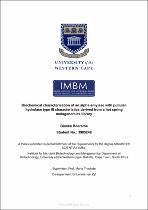Biochemical characterisation of an alpha-amylase with pullulan hydrolase type III characteristics derived from a hot spring metagenomics library
Abstract
The field of metagenomics has provided biotechnological researchers with new enzymes and insight into previously unknown enzyme families with potential for novel modes of action and being able to function under extreme conditions, such as extremes of temperature, acidity or alkalinity. The enzymes can also often act on multiple substrates and show increased affinity for certain substrates. In this study, the aim was to biochemically characterise a putative type III pullulan hydrolase (PHTIII). A sequence-based metagenomic screen from previous performed by Xiao Ping Hu (2010) was used to identify novel glycosyl hydrolase enzymes in shotgun metagenomic sequence data from the Mphizi hot spring in Malawi. An identified ORF, named Pull3.1, displayed low sequence identity to a characterised α-amylase (62.71%) and 61.66% to a characterised pullulan hydrolase type III, and was, therefore, hypothesized to be an α-amylase (EC 3.2.1.1) with pullulan hydrolase type III (EC 3.2.1.x) characteristics. Further sequence analysis indicated that Pull3.1 had a glycogen binding site and that it belongs to the GH13_20 family as well as having a family 48 carbohydrate-binding module. Pull3.1 displayed the highest substrate conversion rates for starch, pullulan and glycogen. The products released were of the following degrees of polymerisation 3, 2 or 1, in accordance with the products released from the PHTIII from Thermococcus aggregans. Pull3.1 is a thermozyme that shows maximum activity at 75°C and an optimum pH of 7. It was thermostable up to 80°C and had a half-life of 11.6 min at 50°C. Further kinetic characterisation showed that Pull3.1 had a high affinity for starch. The KM value of 0.048 mg/ml is within the range reported for other α-amylase enzymes, and Pull3.1 had a Vmaxof 0,729 (μmol mL−1). All of this data indicates that Pull3.1 is a good candidate for a starch conversion process that requires thermozymes.

